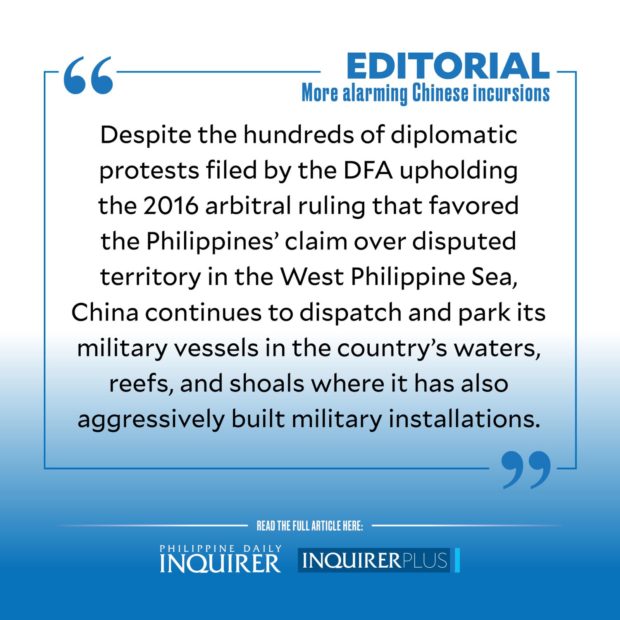While most Filipinos stood transfixed and distracted by the festive campaign sorties leading up to the May presidential elections, China has been stealthily breaching the country’s security parameters and undermining our sovereignty.
The latest incident of China trespassing in Philippine waters prompted the Department of Foreign Affairs (DFA) to summon Chinese Ambassador Huang Xilian on Monday over the “illegal intrusion and lingering presence” of a Chinese ship in the Sulu Sea from Jan. 29 to Feb. 1.
Though the Chinese vessel stoutly maintained that it was exercising “innocent passage” in accordance with Article 52 of the 1982 United Nations Convention on the Law of the Sea, the DFA noted that the People’s Liberation Army Navy stayed in the area for three days, coincidentally, when Philippine and United States forces were holding military exercises. According to sources monitoring the exercises, China’s navy ship was spying on the Filipino-American war games which were intended to boost the mutual defense capabilities of the two longtime allies.
Despite the hundreds of diplomatic protests filed by the DFA upholding the 2016 arbitral ruling that favored the Philippines’ claim over disputed territory in the West Philippine Sea, China continues to dispatch and park its military vessels in the country’s waters, reefs, and shoals where it has also aggressively built military installations.
Even the Philippine Rise east of the country off Aurora province was not spared, with China naming five of its mineral-rich features despite a United Nations declaration that the 13-million-hectare underwater plateau is part of the Philippines’ continental shelf. In a Senate panel hearing on Tuesday, National Security Council (NSC) deputy director general Rufino Lopez Jr. noted that although the NSC has tightened security in the area through the collaborative efforts of the Philippine Coast Guard and the Philippine Navy, China’s unauthorized “research trips” in the area have continued.
The latest Chinese intrusion in the Sulu Sea is particularly alarming, however, in light of the unprovoked war on Ukraine by China’s staunch ally, Russia. China, which stayed officially neutral when Russia annexed Crimea in 2014, stopped short of condemning Russia’s actions in Ukraine. And though it has repeatedly called for negotiations toward a ceasefire and a resolution of the conflict, it also continues to provide diplomatic support to Russia. With Russia recently asking for military equipment from China, US officials have expressed fears that China could help Russia circumvent the economic sanctions imposed on it by Western allies. Zhao Lijian, China’s foreign ministry spokesperson, has dismissed the claims as “disinformation” from the US.
With the US and Western allies kept busy with the conflict in Ukraine, there’s also the worrying scenario that China might push its offensive against Taiwan, which it has long been claiming as its province, and pugnaciously assert its territorial claims over the West Philippine Sea. Could its three-day surveillance of the war games in Sulu be part of gathering military intel on the strength of US-Philippine maritime forces? In July last year, China similarly deployed two surveillance ships to Australia as a large-scale US-Australia military exercise took place. A joint statement signed by Russia’s Vladimir Putin and China’s Xi Jinping in Beijing last month describing their partnership as having “no limits” could easily involve the Philippines in the global struggle between these two behemoths on one side, and the US and its allies on the other.
Given these worrying developments and China’s history of ignoring international laws, the government must push back harder against this superpower’s habitual encroachments into Philippine territory. It should also support a recommendation floated in the Senate panel hearing for the NSC to issue more guidelines requiring all foreign vessels, including those designed for marine scientific research, to obtain a “no objection letter prior to passage in the Philippine territorial sea.”
The next administration should take a stronger approach as well in fighting for our sovereignty and asserting our arbitral victory in the West Philippine Sea, while repudiating President Duterte’s defeatist stance that says the country is no match in a war with China. As our neighboring countries and fellow claimants have shown, protesting China’s overreaching claims and military aggression doesn’t mean going to war. With other countries using our arbitral victory for leverage, we can count on the support of the international community in fighting for what is ours.
Let’s seize the prevailing global mood against rogue behavior by countries like Russia and China to firm up our claim. There’s a lesson as well from how the US and its European allies have bonded together to support Ukraine and hit Russia with economic and diplomatic sanctions. No need to go to war with Russia (or in our case, China), this alliance telegraphs; there are other ways to confront and defeat the aggressor.
